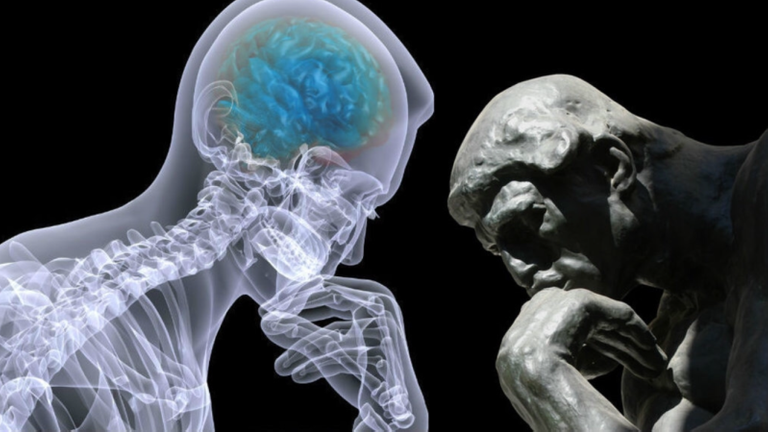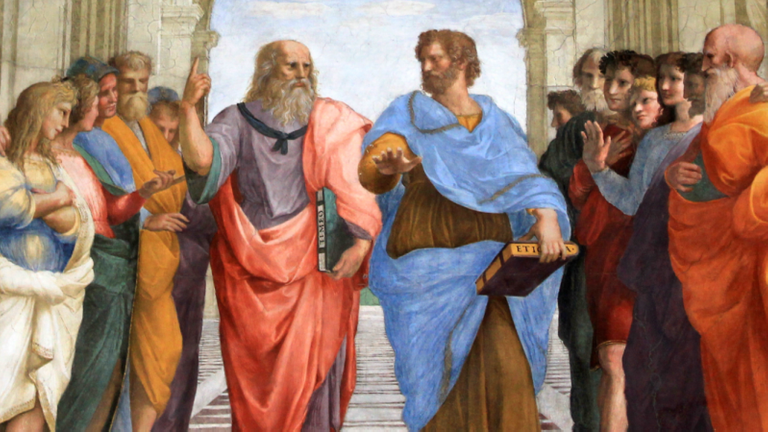
“There's a man going around taking names
And he decides who to free and who to blame
Everybody won't be treated all the same
There'll be a golden ladder reaching down
When the man comes around” – Johnny Cash
Amazing: We are two and a half months into the Steemit Book Club. An idea has become a reality has become a Steemit institution.
So let’s dive in:
Chapter 9 opens with Stephen Dedalus at the National Library, accompanied by mystic poet George William Russell and essayist (and assistant librarian) John Eglinton.
The latter using a slight tone of irony, suggests that Stephen should re-write Paradise Lost --only this time, he should write it from Satan’s perspective.
Now I know what you might be thinking: Which mystery is James Joyce leaving us with here?
In John Milton’s Paradise Lost, Satan and a few of his fallen angels have descended to earth and as an act of rebellion they wanted to corrupt God’s creation, the humans.
Satan then went to the Garden of Eden to deceive Adam and Eve to eat from the tree of knowledge.
First he appeared as a toad and started whispering in her ear, and then as the story goes he re-appeared again, this time as a snake and he finally convinced Eve to take a bite in that Apple.
Now the most immediate question on last week’s book club was to solve one of the mysteries from Ulysses: Could that be a reference to the identity of The Man in the Macintosh? The macintosh apple in the Garden of Eden?
Curiously, as John Eglinton is suggesting the re-write of John Milton’s novel, Russell jumps in and throws in a peculiar joke that Stephen would need seven disciples to write it.
Could that be a reference to the seven fallen angels that descended with Satan to earth in Paradise Lost?
Yes, we are deep in the labyrinth of Ulysses now.
However, that was by no means not what this chapter is about, the main theme of Scylla and Charybdis is about the fierce debate between how two sides view the same thing in entirely different way.
We’re caught between Stephen’s Aristotelian Dogma and John’s Platonic views, and with Hamlet as parallax.
In a sense, it was brilliant from Joyce to give us a preview on the theme of parallax in the last chapter with Leopold Bloom.
An even cooler preview we can find is in the very first chapter when Haines asks Stephen about his views on Hamlet, only to get interrupted by Buck Mulligan who had this to say:
“No, no… Wait till I have a few pints in me first.”
Needless to say, Mulligan was right, because the debate about Hamlet between Dedalus and Eglinton was very hard to digest. It’s one of the most difficult chapters in the book since the Proteus chapter. Both sides were so locked into their inflexible mindsets and their pre-conceived ideas that there was no space left for common ground.
It was almost as if it reminds you of certain election debate we’ve seen recently—and with just as many conspiracy theories.
Coincidentally, if you were to Google “Scylla and Charybdis,” one of the first definitions you will find is actually “The Lesser of Two Evils”.
“Unsheathe your dagger definitions.”
Also in this chapter we see Joyce’s huge ambition at work: To become, himself, the next Shakespeare.
“Our national epic has yet to be written,” the chapter states. Could this be it?
Chapter 9: Scylla and Charybdis
In Homer’s Odyssey, after Odysseus has buried Elpenor, the youngest man who has survived The Lestrygonians, he was approached by Circe who gave him a warning: “One of two courses you may take.”
Odysseus then had to make a choice between facing Scylla, a six-headed monster, or Charybdis, a whirling maelstrom.
In a way, he either had to be pragmatic and lose six men facing Scylla or he had to stick to his ideals and risk losing everyone if caught in the whirlpool from doom.
The first Ulysses parallel that comes to mind is Stephen and John, and their favorite philosophers: the idealistic Plato or his pragmatic student Aristotle. This is something that totally affects the way each one of them views Hamlet.

And the parallelisms continue:
“A ghost is one who has faded into impalpability through death, through absence, through change of manners” – Stephen Dedalus.
At first glance this ghost may reminds us of Bloom who lost his son, Odysseus who was absent from his home and wife for years, and also of Stephen himself.
But this chapter sheds a light on a new angle in which Shakespeare goes into his own play and plays the ghost part (Hamlet’s father). We also learn that Shakespeare had a son called Hamnet, who died prematurely and whom Hamlet was supposedly based upon.
Hamnet in this case is also drawing a clear parallelism to Leopold Bloom’s son Rudy, who also died prematurely.
At the same time, Hamlet also represents Stephen, who suggests that Anne Hathaway (Shakespeare’s wife) is the guilty queen who betrayed the king. (“If others have their will, Ann hath a way.”)
Here again, we see the genius way in which Joyce creates all these fascinating parallelisms. In this case, the cheating queen is a direct reference to Odysseus’s wife, Penelope and Bloom’s wife, Molly.
However, despite the recurrent theme of betrayal and infidelity, Stephen voices a very strong opinion about parenthood when he says: “A father, is a necessary evil”.
Yet the chapter leaves us feeling that a “real” father is exactly what he needs: Not his lame biological father, but his symbolic Bloom father who appears at the end of the chapter.
Stephen Dedalus is Icarus, the ineffectual dreamer, and his dream in Proteus, speaks to the need he has for father and family and love to stay grounded and not burn up in the sun of his own brooding.
Let us know your thoughts in the comments below. Meanwhile, here’s the recording of session 10 of the steemit Book Club:
https://soundcloud.com/user-471385730/steemit-book-club-part-10
“Life is many days. This will end.”
NEXT WEEK’S SBC CALL
Steemit Book Club, Session 11
Book: James Joyce, Ulysses (Preferably Gabler Edition)
Reading Assignment: Chapter Ten (“The Wandering Rocks”)
Date: Monday, November 21st
Time: 6 p.m. PST / 9 p.m. EST / 2 a.m. GMT / 11 a.m. (Tuesday) UTC
Phone: (800) 719-6100 or (218) 339-7800, access code 629-1831#
Web audio link (and location for international call-in
numbers): https://hello.freeconference.com/conf/call/6291831
Chat: #steemit-book-club channel on steemit.chat
Best,
@neilstrauss, @the-alien, and the #steemit-book-club
P.S. Note that the Comments section of this post will also serve as a discussion forum for the current reading.
Loving all this stuff! Busy today. May try to comment some later.

Also shared on twitter
That was an mind-picking chapter for sure, can't wait to hear what you guys think about it!
thank you for posting this.. the post looked interesting
Wow.....population of Dublin was only 500,000 peope-ish, so if you didn't have TV, radio, or an iphone birds of a feather flocking together, i reckon you would bump heads with the same class of folk.
Apparently Guinness is full of preservatives? I don't care it taste great. I was once told, swallowed whole and have never checked the facts as it sounds great, if you drink 19 pints of Guinness you have enough protein not to need food..... i think 9 would have me mopping the floor with my jaw.
So i read this line and i proper cracked a giggle. (808) The Most Spiritual Snuffbox to Make the Most Devout Souls Sneeze. ..... It is an age of exhausted whoredom groping for its god... What the f#ck is this line in reference too..... The start of this dialogue here starts with - (800) She lies laid in stark stiffness----who is she? --so i tracked it back-- to another her---and the next is (668) Ann, ages back and then, i read more, and got lost and made connections and i don't know what illogical mythical patterns i am making...i just dig that line.... and all the symbols it make my mind think about…..and then i reread...this (763) Just mix up a mixture of theologicophilolological. Hahaha...sure, i have no idea what is happening, but it is mystical. ...this is then linked back, (795) Buck says we are getting mixed....
I also found some translations....(775) Pogue mabone! Acushla macbree!---- means!!! Wait for it kiss my ass. my sweet heart, linking back to the previous chapters..... we are destroyed, could be an Odessey link... losing the men to the Scylla???--a stretch---- but maybe??
Then (815) it says he lay back, like the woman laid out dead at (800)
.....anyway.....my brain is MELTING! .I watched Hypnernoralisation by Adam Curtis the other day and have been wondering about how culture is formed......it feels like i am looking through a kaleidoscope on LSD and seeing the post modern world unfold before my eye on paper in this tree back. Giddy up.
My buddy and I hitch hiked around Ireland in the name of James Joyce in 2010. I had never read his book, but we needed a purpose……. Wish I had read some before that madness.
This chapter reminded my of Portrait of an Artist quite a bit.... Stevie D and his deep waxings.
Love that line, it is so fitting.
Hey guys, I missed the call last week. Is there a writeup and a recording somewhere I can listen to before Monday?